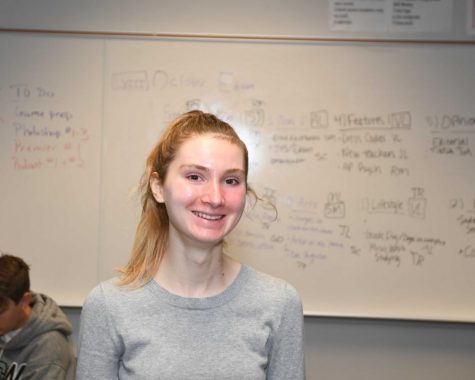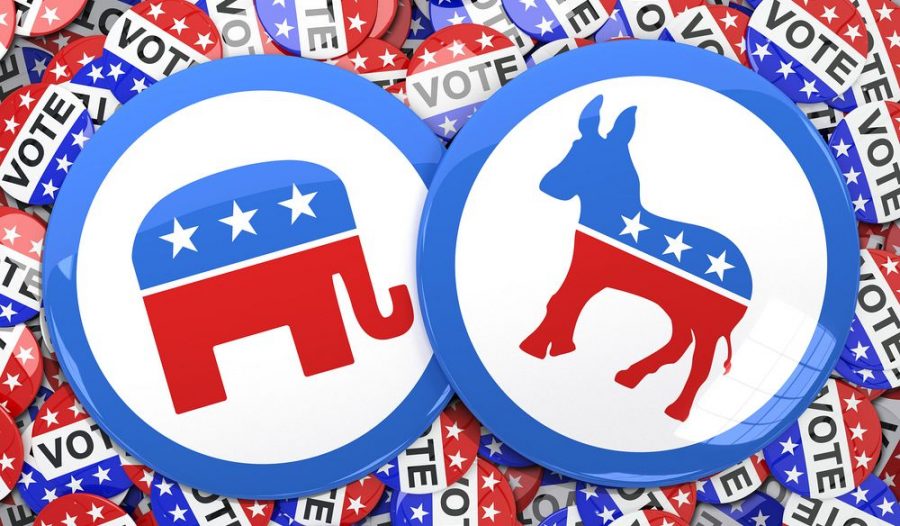Young Conservatives for Change encourages partisanship on campus
Young Conservatives for Change, a newly established club this year, explicitly champions conservative values.
When students register to vote at 16, one of the first questions they must respond to is which political party they would like to join. Party association, most often presented as a dual choice between Democrat and Republican, is so pervasive in political discourse that it’s difficult to be civically engaged without adopting a partisan lens.
In light of the supremacy of the two major political parties and their corresponding ideologies—conservative and liberal—it may seem surprising that Jesuit’s clubs surrounding political goals or discussions steer away from partisan labels. Instead, neutral names such as “Current Events Club” or “Junior State of America” provide a space for students of all political philosophies to educate themselves on topical issues and develop a more nuanced perspective.
Clubs like JSA provide a useful forum for a large coalition of politically-engaged students: those questioning their party affiliation, those who consider themselves independent or somewhere in the center, as well as students with relatively defined partisan stances who are looking to challenge their existing beliefs.
“Being partisan-related makes it super constrictive about what is okay to say,” JSA leader Brian Xu said. “Here we’re all about ‘you can say anything you want’, and you might say something [controversial] and get repercussions for it, but at least you can express your opinion. I think the majority of people who join JSA would rather debate about the issues, whether it’s a Republican or Democratic idea.”
However, neutral current events clubs still have their limitations. While high school students have a reputation for being politically ignorant or for juggling emergent, uncertain political views, a significant majority feel attached to a particular party. In a November 2018 Jesuit Chronicle survey, 75.1% of respondents expressed a preference for either the Republican or Democratic Party, with only 15.3% identifying as unsure.
Senior Parthav Easwar decided to join the Democratic Party after informing himself extensively on its platform and on current issues, but he emphasizes an acute awareness of its flaws. “I felt that liberal ideology more aligned with my own beliefs about how the world works and how the world should be,” Easwar said. “I don’t necessarily like everything the Democratic Party does, and if there was a party that aligned with my beliefs more, I would subscribe to that over the Democratic Party.”
When the labels Republican and Democrat, conservative and liberal remain abstract, secondary facets of political discussion, it’s easy to treat each of the major parties as a monolith representing only a single policy viewpoint on crucial issues. Yet in reality, both the Republican and Democratic Party have internal intra-party fissures and contradictions that demand discernment for those who identify with a broad party banner.
Organizations like Young Democrats and Young Republicans, while nearly universally absent among high schools, are ubiquitous on college campuses. Often falling somewhere between an ideological safe space and a forum for hashing out intraparty variation and disagreement, party-based clubs for students can help establish a clearer outline of the contours and ideological breadth of each political party. Party-affiliated organizations can also provide a place for students to find agreement, rather than dissent, that uplifts their principles and helps them better defend their policy stances.
That philosophy has received representation through Jesuit’s only current ideological club: Young Conservatives for Change. Established this year by senior Caesar Tyson, the club outlines its purpose as “a space for students that identify with more traditional conservative values or beliefs to engage in healthy discussion and debate, as well as introducing ideas to others and establishing a rough idea of this ideology” (Jesuit Clubs and Activities Guide). Tyson declined a request for comment.
Given Young Conservatives’ mission statement, the club’s pursuits appear twofold: it attempts to create a mutual space for conservative students while also establishing the merits of conservatism. However, both the name of the club and its description leave unclear what precise branch of “conservative” ideology it plans to emphasize.
Even some students with a partisan affiliation are hesitant towards the precedent Young Conservatives sets for ideologically-oriented clubs on campus, particularly concerning their potential for creating an echo chamber in an already fraught partisan environment.
“If you have Young Conservatives club, and if we were to have a Young Liberals club, all that’s happening is people are going to go to the clubs that they align with and they’re going to be indoctrinated with what they already believe,” Easwar said. “They’re never going to get the idea that this country is one that’s built on cooperation and bipartisan relationships.”
Young Conservatives for Change has yet to meet since its creation, and as a monthly club, its impact on political discourse outside the confines of the club remains indeterminate. However, rumors have abounded among the student body since word spread of Young Conservatives’ existence, suggesting students have more opinions about party affiliation than politically neutral outlets allow for.
“I think that underneath the surface there’s a lot of stigma based on the connotations each party has,” senior Lauren Haines said. “If your parents are conservative and constantly talking about how stupid the other party is, then if your friend is like, ‘hey, I’m a liberal,’ there’s going to be at least an undercurrent of malease.”
Regardless of whether Young Conservatives for Change will prove itself an effective forum for students to transparently discuss their interpretations and disagreements with party labels or if it will devolve into an insulated safe space, Haines acknowledges the cultural tension that avoiding partisan discussions creates within the student body.
“Young Conservatives is grounded in rumor and speculation, and the same problem exists with liberalism and conservatism at this school,” Haines said. “If people are not willing to talk explicitly about it, if you can’t talk about something to etch out its nuances, you’re not going to be able to define conservatism more than this shadowy figure, and I think that’s the problem with party and politics at this school.”

Shawna Muckle, 17, is a senior at Jesuit High School. She has been a member of the Chronicle staff for three years in various capacities, and she is currently one of its chief editors. Shawna is fascinated by politics and government, and she enjoys writing articles for the Chronicle pertaining to local and national political developments, alongside issues tied to social justice and personal identity. Some of her favorite pieces she’s written include a feature on Jesuit students’ experience with microaggressions, a recap of the 2018 midterm elections, and an article discussing last year’s clerical abuse scandal within the Catholic Church. Outside of journalism, Shawna is the leader of Jesuit’s Model United Nations club and a member of her school’s Ethics Bowl team, which was a 2019 national champion. Shawna is also a Precinct Committee Person for the Washington County Democrats. In her free time, Shawna can be found aggressively running up hills, drinking boba, and yeeting off on road trips to Seattle (for unspecified reasons). Ask her about her opinions on Congress, specifically a) Republicans and b) the crisis with the federal deficit. In the future, Shawna hopes to pursue journalism in college and, later on, as a congressional reporter in DC.




